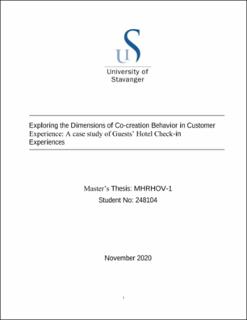| dc.description.abstract | The study begins by reviewing forces that affect competitive advantage -paradigm shift forces, and economic offerings forces -that is the progressive forces pushing economic value over time, for example: from goods, to services, to experiences and now to co-creation. Influence of the forces in the natural environment affect the product, what organizations must do to present an acceptable product and how it is requested of by the consumer. The consumer appears to influence the product more, thus, organizations seek to align with consumer needs more in an experiential and cocreative manner, or as the consumer is requesting of the product. Even the paradigm shifting forces such as technology, become a prerogative partly controlled by the new way of asking for the product by the guest, ultimately bestowing control of it in part to the consumer. Experiential designs are made such that both the service providers and guests share the same meaning for value. Co-creation offers the same, plus the ability to have new personal experiences, through a process of co-construction and interactions. Co-creation is divided into physical and mental/psychological participation and this study aligns itself to looking at the psychology of co-creation behavior.
Data was collected using an online survey from PhD students in four universities in Norway. Exploratory Factor Analysis (EFA) was done, and the measurements were weighed to produce a table of weighted average mean, giving five compounded variables that were used in correlation analysis. The lifestyle component could not be loaded on the EFA as it was not in line with the seven-point Likert scale designs and could not be equally weighed. This component was explained using means, standard deviations, skewness, and kurtosis. Findings gave the hierarchy as follows: Cognitive, Pragmatic, Emotional, Sensory and Relational. These are the most important to the least important psychological components that influence co-creative behavior. The lifestyle component was seen as one with the potential to shift in level of importance within groups. Service providers such as hotels, adventure tourism companies, even technology companies where guests interact with the product before purchase, could benefit from following this hierarchy by creating an offering that is cognitively engaging, pragmatically authentic and interactable with; emotionally engendering with just the right amount of sensory engagement for interaction with the product and relational to some extent, that is, either participating with friends or with oneself. Lifestyle should be considered with caution; standardized offers could mitigate the risk of alienating clients ascribing to different lifestyles. | en_US |
